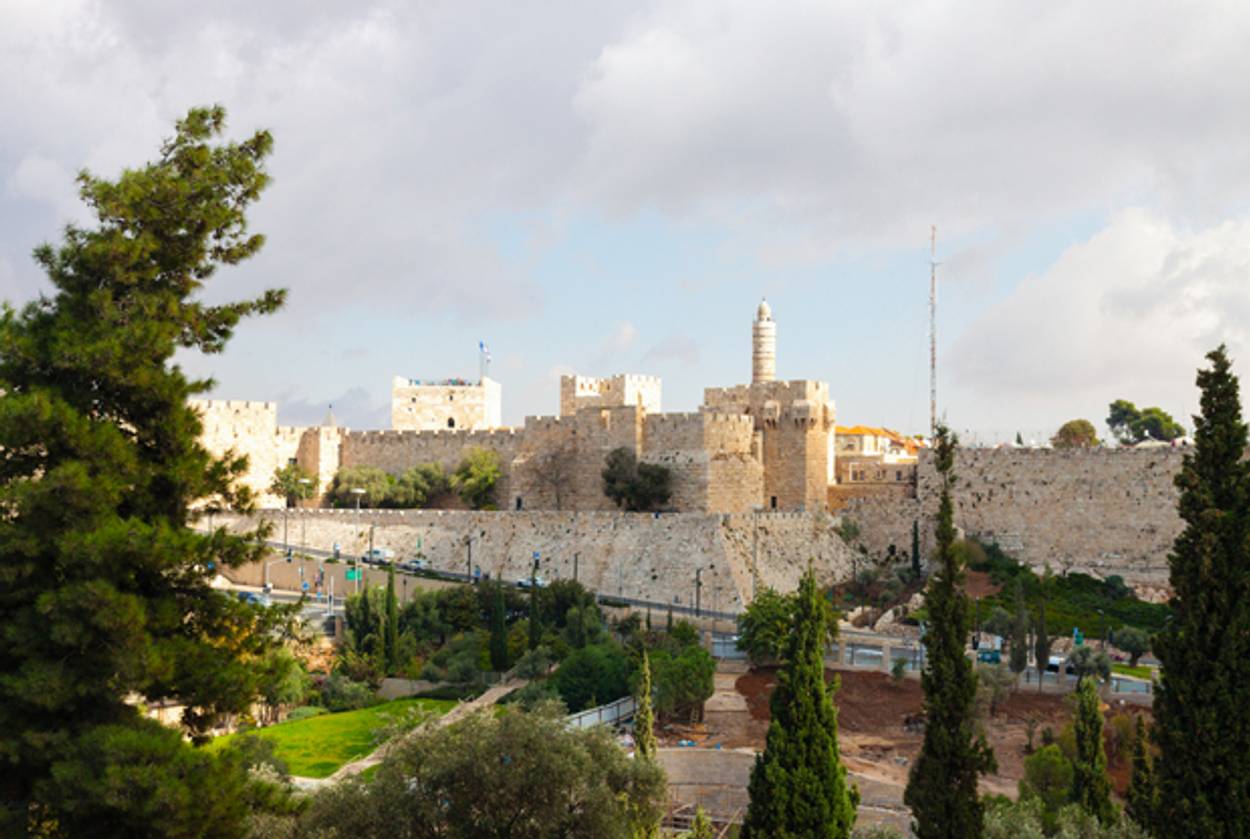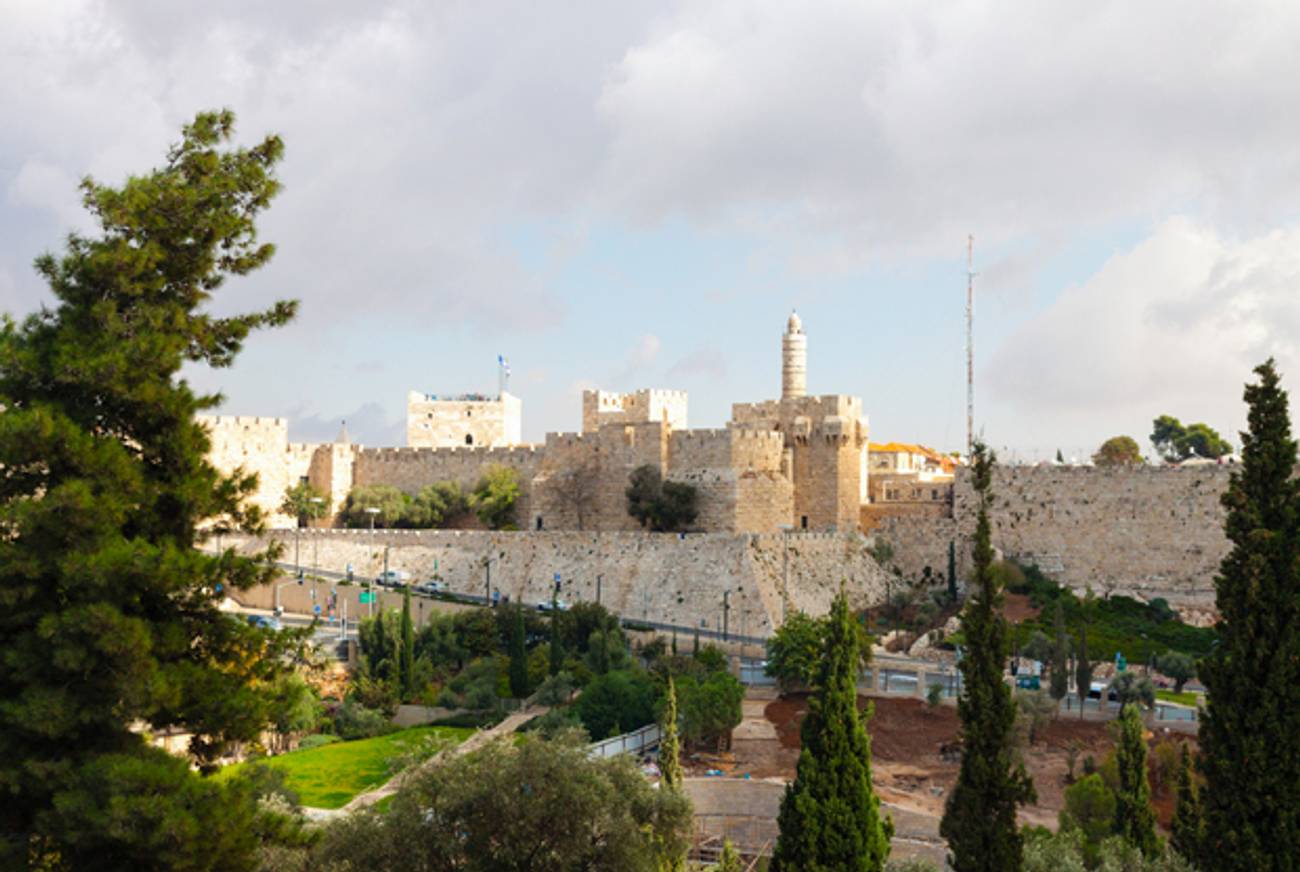In Jerusalem, The Show Must Go On
New Israeli films and the occasional siren at the Jerusalem Film Festival




This year’s Jerusalem Film Festival, which ends Sunday, will surely go down as one of the annual event’s most memorable editions—and mainly for the right reasons. The festival opened last week at the Jerusalem Cinematheque, which from its breathtaking perch above the Valley of Hinnom, across from the Old City walls, regularly serves as this complicated city’s greatest cultural refuge. Festival and Cinematheque alike have weathered worse storms than Operation Protective Edge—two Intifadas, for example—and the festival, which prides itself on hosting an impressive contingent of international guests, has faced this latest uphill battle with aplomb.
That said, there were still some hiccups. Korean director Chan-wook Park (Oldboy) was on hand to give a master class, but Spike Jonze, the festival’s other major headliner, despite having already arrived in Israel, decided to opt out of the festival at the last moment, writing:
It felt like the wrong time for me to be talking about movies with everything going on. I hope you understand. I will come back again and screen movies and talk film with you when the time is right.
Screenings were interrupted by the occasional siren. At one point, I found myself huddling with a couple dozen mildly amused cinephiles in the building’s basement, surrounded by ceiling-high stacks of old film reels. The whole situation added new a new wrinkle to the Israeli slang for “don’t freak out”—“al tikanes lesratim”—which translates literally as, “don’t go into movies.”
Thankfully, there was no shortage of movies. The 10-day program included more than 200 films from 50 different countries, but the ones made locally have gotten the bulk of the attention. This should come as no surprise. As the critic Yair Raveh has noted, the Israeli film renaissance of recent years has been something of a miracle. The number of movies made here annually has doubled over the past decade. Nearly 40 full-length feature films were made in Israel this past year. The country (population 7.8 million) is now churning out almost as many films as Brazil (population 200 million), with consistently strong showings at international festivals (six Israeli films screened at Cannes this year).
The centerpiece of the Jerusalem festival is the Haggiag Competition for Israeli feature films, which included Israeli premieres of some of this year’s strongest local productions. The competition included two gut-wrenching films about incest, Keren Yedaya’s That Lovely Girl and Tali Shalom Ezer’s Princess. Despite similar themes, the two are very different: Yedaya’s film, similar to her acclaimed debut Or (My Treasure), is unflinchingly realistic in its portrayal of a woman in her early 20s and a man in his 50s who live as both couple and father and daughter. Princess tells of 12-year-old Adar. As her mother’s boyfriend begins abusing her sexually, the film veers toward magical-realism, all the while remaining grounded in urban Israel.
Far more entertaining, though no less thought-provoking, was Shira Geffen’s Self Made. Geffen’s delightful 2007 effort, Jellyfish (co-directed with her husband Etgar Keret, with whom she shares a particularly off-beat sense of humor) won the Camera d’Or at Cannes. Self Made blends the whimsical with the starkly realistic in its tale of two women—an Israeli artist and a Palestinian factory laborer—who end up switching places under the oddest of circumstances.
Nadav Lapid, whose stark, formalist The Policeman from 2011 seemed to predict the J14 social protest movement that erupted around the time of its premiere, this year came with The Kindergarten Teacher. Nira, the film’s titular teacher, grows increasingly obsessed with Yoav, a five-year-old poetry prodigy whom she fears may be too sensitive to get by in the world. Already a hit among critics at Cannes, the film was one of this festival’s strongest showings.
The week’s gala premieres were a mix of the festive and the somber. The directors seemed torn between their belief in their films and the inescapable realities of Israel and Gaza. On Monday, the directors with films in the Haggiag Competition assembled to read out a public letter saying that they:
could not only talk about film, as if no killing and horrors are taking place. Some of us are parents, and we are scared too. Our children are terrified by the sirens and booming sounds of war. We do not seek revenge and we do not believe in a military solution that has already proved to be a failure. The children of Gaza have no Iron Dome, bomb shelters or sirens. The children of Gaza are tomorrow’s partners. The killing and horror that we inflict only distance us from a diplomatic solution.
The festival’s traditional opening-night event, a screening in the adjacent Sultan’s Pool, also fell victim to circumstance, when authorities ruled that an open-air event with upwards of 3,000 participants was out of the question in light of the Hamas rocket attacks. This year’s selection was Dancing Arabs from director Eran Riklis, about a gifted young man, Eyad, who leaves the Arab village of Tira to go to an elite boarding school in Jerusalem, where he falls in love and wrestles with questions of identity. Sayed Kashua, who adapted two of his own novels for the screenplay, has long entertained readers of his books and Haaretz columns with his autobiographical stories of life as an Arab in Israel torn between Jewish-Israeli society (he writes almost exclusively for a Hebrew-speaking audience) and his native village Tira, even as he is disgusted by the failures of both.
But just as Dancing Arabs was primed to become a breakout hit, the past month’s developments resonated in Kashua’s increasingly bleak columns. He had already planned on spending the year abroad with his family—on a teaching gig at the University of Illinois at Urbana-Champaign, of all places—but by his latest column he wasn’t sure if he was ever coming back. Dancing Arabs, which veers between the high comedy of growing up in Tira and the existential tragedy of a doomed Jerusalem love affair, is a treasure, as is Kashua himself. The film will have its grand open-air premiere next month—not in Jerusalem but in Locarno’s Piazza Grande. Whether mainstream audiences here, Arab and Jew alike, will have it in them to enjoy it during these dark days (the Arabs of the title misguidedly dance on the rooftops as Saddam Hussein lobs Scud missiles at Israel during the Gulf War) is another question.
More optimism was to be found in the festival’s documentaries, though they too were bittersweet. The Go-Go Boys recounts the rise and fall of director Menahem Golan and producer Yoram Globus, who went from being pioneers of the Israeli film industry to turning their studio, The Cannon Group, into Hollywood’s B movie empire, launching the careers of Chuck Norris, Jean-Claude Van Damme, with hubris, ingenuity, and bucket loads of chutzpah. The Voice of Peace, a German production, tells the story of former Israeli fighter pilot Abie Nathan who, between 1973 and 1993, ran a pirate radio station “from somewhere in the Mediterranean” (in reality just outside Israeli territorial waters, off the coast of Tel Aviv). Though Nathan was broke and largely forgotten by the time of his death six years ago, the film serves as a reminder of how his peace activism—and excellent taste in music—helped goad a largely reluctant Israeli body politic into giving peace a chance.
Two festival events transported audiences 66 years back in time to Israel’s inception in a way that could not have been more relevant to today’s troubles. First off was David Mamet, a festival regular, who gave a Friday evening reading of his recent novella The Handle and the Hold (from Three War Stories). The novella, which he called “a love letter to Zionism and the United States of America,” was about two American con men—Jewish war vets both—who steal a bomber plane for the struggling war effort in pre-State Palestine. Mamet said he was inspired to write the story through conversations with close friends of his, the late Al Schwimmer—the architect of the smuggling effort who later established the Israel Aerospace Industries—and Lou Lenart, the World War II vet who joined the Israeli Air Force as a foreign volunteer and was one of its first heroes.
Lenart himself was on hand just a few days later for a special screening of Above and Beyond, the story of how he and other American volunteers helped form Israel’s fledgling air force. Directed by Roberta Grossman, the film is drawn primarily from interviews with surviving veterans and their family members (including an unlikely Paul Reubens, whose father, Milton Rubenfeld, was one of the volunteers). But it also makes clever use of flight recreations and special effects to provide for much more than a traditional talking-heads film—not all that surprising when one takes into account that the film’s producer is Nancy Spielberg, the mother of singing sensation Jessica Katz, and sister to Steven Spielberg.
Following the screening, she said that after reading Al Schwimmer’s obituary she became interested in how an American had become the Godfather of the IAF. “It sounds like a Spielberg film,” she said. It escaped no one that 66 years later, it is that same IAF, again with significant American contributions, that with its Iron Dome allows for Jerusalem to play host to a film festival, so that even when the cannons and sirens are heard, the muses are anything but silent.
Related: Screen Doors
Arab Israelis, Undivided
Tal Kra-Oz is a writer based in Tel Aviv.